
Human rights in the Soviet Union were severely limited. The Soviet Union was a totalitarian state from 1927 until 1953 and a one-party state until 1990. Freedom of speech was suppressed and dissent was punished. Independent political activities were not tolerated, whether they involved participation in free labor unions, private corporations, independent churches or opposition political parties. The citizens' freedom of movement was limited both inside and outside the country. The state restricted citizens' rights to own private property.
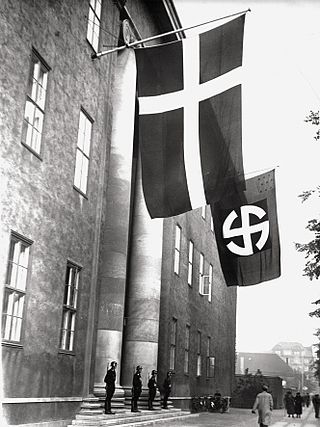
At the outset of World War II in September 1939, Denmark declared itself neutral. For most of the war, the country was a protectorate and then an occupied territory of Germany. The decision to occupy Denmark was taken in Berlin on 17 December 1939. On 9 April 1940, Germany occupied Denmark in Operation Weserübung. The Danish government and king functioned in a relatively normal manner in a de facto protectorate over the country until 29 August 1943, when Germany placed Denmark under direct military occupation, which lasted until the Allied victory on 5 May 1945. Contrary to the situation in other countries under German occupation, most Danish institutions continued to function relatively normally until 1945. Both the Danish government and king remained in the country in an uneasy relationship between a democratic and a totalitarian system until 1943 when the Danish government stepped down in protest against German demands that included instituting the death penalty for sabotage.
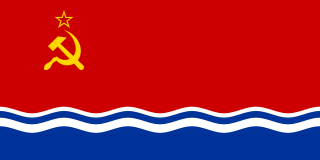
The Latvian Soviet Socialist Republic, also known as Soviet Latvia or simply Latvia, was a republic in the Soviet Union. The Latvian SSR was in existence for just over 50 years, from August 5, 1940, to September 6, 1991.

The Danish resistance movements were an underground insurgency to resist the German occupation of Denmark during World War II. Due to the initially lenient arrangements, in which the Nazi occupation authority allowed the democratic government to stay in power, the resistance movement was slower to develop effective tactics on a wide scale than in some other countries.

The Peace Preservation Law was a Japanese law enacted on April 22, 1925, with the aim of allowing the Special Higher Police to more effectively suppress socialists and communists. In addition to criminalizing forming an association with the aim of altering the kokutai of Japan, the law also explicitly criminalized criticism of the system of private property, and became the centerpiece of a broad apparatus of thought control in Imperial Japan. Altogether more than 70,000 people were arrested under the provisions of the Peace Preservation Law between 1925 and its repeal by American Occupation authorities in 1945.
The Act to Protect the Province Against Communistic Propaganda, commonly known as the "Padlock Law" or "Padlock Act", was a law in the province of Quebec, Canada that allowed the Attorney General of Quebec to close off access to property suspected of being used to propagate or disseminate communist propaganda. The law was introduced by the Union Nationale government of Maurice Duplessis and made it illegal to "use [a house] or allow any person to make use of it to propagate Communism or Bolshevism by any means whatsoever". This included printing, publishing or distributing of "any newspaper, periodical, pamphlet, circular, document or writing, propagating Communism or Bolshevism". Violations of the Act subjected such property to closure by the Attorney General, including the locking of access doors with padlocks, against any use whatsoever for a period of up to one year and any person found guilty of involvement in prohibited media activities could be incarcerated for three to thirteen months.

Antonín Josef Novotný was First Secretary of the Communist Party of Czechoslovakia from 1953 to 1968, and also held the post of president of Czechoslovakia from 1957 to 1968. An ardent hardliner, Novotný was forced to yield the reins of power to Alexander Dubček during the short-lived reform movement of 1968.

The Communist Party of Denmark is a communist party in Denmark. The DKP was founded on 9 November 1919 as the Left-Socialist Party of Denmark, through a merger of the Socialist Youth League and Socialist Labour Party of Denmark, both of which had broken away from the Social Democrats in March 1918. The party adopted its present name in November 1920, when it joined the Comintern.

The Constitutional Act of the Realm of Denmark, also known as the Constitutional Act of the Kingdom of Denmark, or simply the Constitution, is the constitution of the Kingdom of Denmark, applying equally in the Realm of Denmark: Denmark proper, Greenland and the Faroe Islands. The first democratic constitution was adopted in 1849, replacing the 1665 absolutist constitution. The current constitution is from 1953. It is one of the oldest constitutions in the world. The Constitutional Act has been changed a few times. The wording is general enough to still apply today.

Karl Rudolf Werner Best was a German jurist, police chief, SS-Obergruppenführer, Nazi Party leader, and theoretician from Darmstadt. He was the first chief of Department 1 of the Gestapo, Nazi Germany's secret police, and initiated a registry of all Jews in Germany. As a deputy of SS-Obergruppenführer Reinhard Heydrich, he organized the World War II SS-Einsatzgruppen, paramilitary death squads that carried out mass-murder in Nazi-occupied territories.
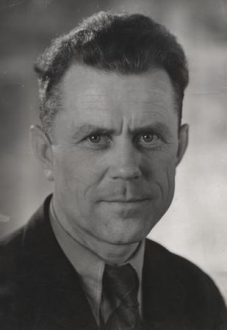
Aksel Larsen was a Danish politician who was chairman of the Communist Party of Denmark (DKP) and chairman and founder of the Socialist People's Party. He is remembered today for his long service in the Communist Party of Denmark, for his time as a concentration camp inmate at Sachsenhausen, and for being the founder of the Socialist People's Party.
In World War II, some individuals and organizations and governments collaborated with the Axis powers, "out of conviction, desperation, or under coercion." Nationalists sometimes welcomed German or Italian troops, believing they brought liberation from colonization. The Vichy, Danish and Belgian governments attempted to appease or bargain with the invaders, in hopes of mitigating harm to their citizens and economies. Some countries cooperated with Italy and Germany because they wanted to regain territory which they had lost during and after the First World War or which their citizens simply coveted. Others, such as France, already had fascist movements or anti-semitic sentiment, which the invaders validated and empowered. Individuals such as Hendrik Seyffardt in Czechoslovakia and Theodoros Pangalos saw collaboration as a path to power in their country. Others believed that Germany would prevail, and either wanted to be on the winning side, or feared being on the losing end.
Martin Nielsen, was a Danish politician, managing editor, member of parliament for the Communist Party of Denmark and Holocaust survivor.

Eastern Bloc politics followed the Red Army's occupation of much of Central and Eastern Europe at the end of World War II and the Soviet Union's installation of Soviet-controlled Marxist–Leninist governments in the region that would be later called the Eastern Bloc through a process of bloc politics and repression. These governments contained apparent elements of representative democracy to initially conceal the process.
The Sovietization of the Baltic states refers to the sovietization of all spheres of life in Estonia, Latvia and Lithuania when they were under control of the Soviet Union. The first period deals with the occupation from June 1940 to July 1941 when the German occupation began. The second period covers 1944 when the Soviet forces pushed the Germans out, until 1991 when independence was declared.

Denmark–Soviet Union relations refers to the historical relations between Denmark and Soviet Union. Denmark had an embassy in Moscow, and the Soviet Union had an embassy in Copenhagen. Diplomatic relations were described as "excellent". Denmark recognized de jure the Soviet Union on 18 June 1924.
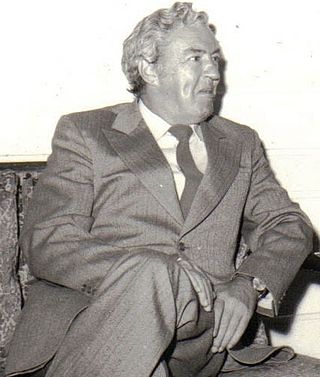
Knud Jespersen was a Danish politician. Jespersen served as chairman of the Communist Party of Denmark between 1958 and 1977 and was a member of parliament between 1973 and 1977.
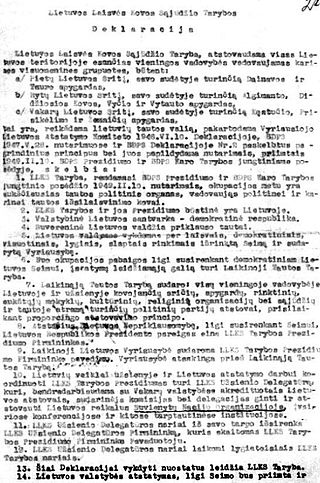
Lithuanian Partisans Declaration of February 16, 1949 is a document, created by Lithuanian partisans and signed by Union of Lithuanian Freedom Fighters (ULFF) on February 16, 1949 in Minaičiai. By signing the declaration, the ULFF assumed responsibility to lead the restoration of independent democratic state of Lithuania, where equal rights for all citizens and social care is guaranteed. Document also states that "Communist party, as dictatorial and essentially opposite to the main aim of Lithuanian nation and keystone provision of the Constitution – independence of Lithuania, – is not considered a legal party". The declaration appeals to the Universal Declaration of Human Rights, Lithuanian Constitution of 1922 and addresses whole democratic world asking for help.
The Samsing Group was a Danish resistance group in Aarhus, Denmark active from June 1943 until 6 June 1944. The group consisted of Willy Samsing, his three brothers and 10-12 other men. The group conducted some 60 large and small sabotage actions in and around Aarhus and were the driving force behind resistance operations in the city in the early years. In addition to sabotage the group collected weapons and supplies airdropped by the allies and supplied them to other groups in Jutland. In 1944 the group was dismantled by the German authorities and its members arrested. The group worked with a loosely based group of university students that had been active since 1942.

Patarei Prison, also known as Patarei Sea Fortress and Tallinn Central Prison, commonly known as The Battery (Patarei), is a building complex in Kalamaja district of Tallinn, Estonia. The premises cover approximately four hectares of a former sea fortress and prison, located on the shore of Tallinn Bay.














